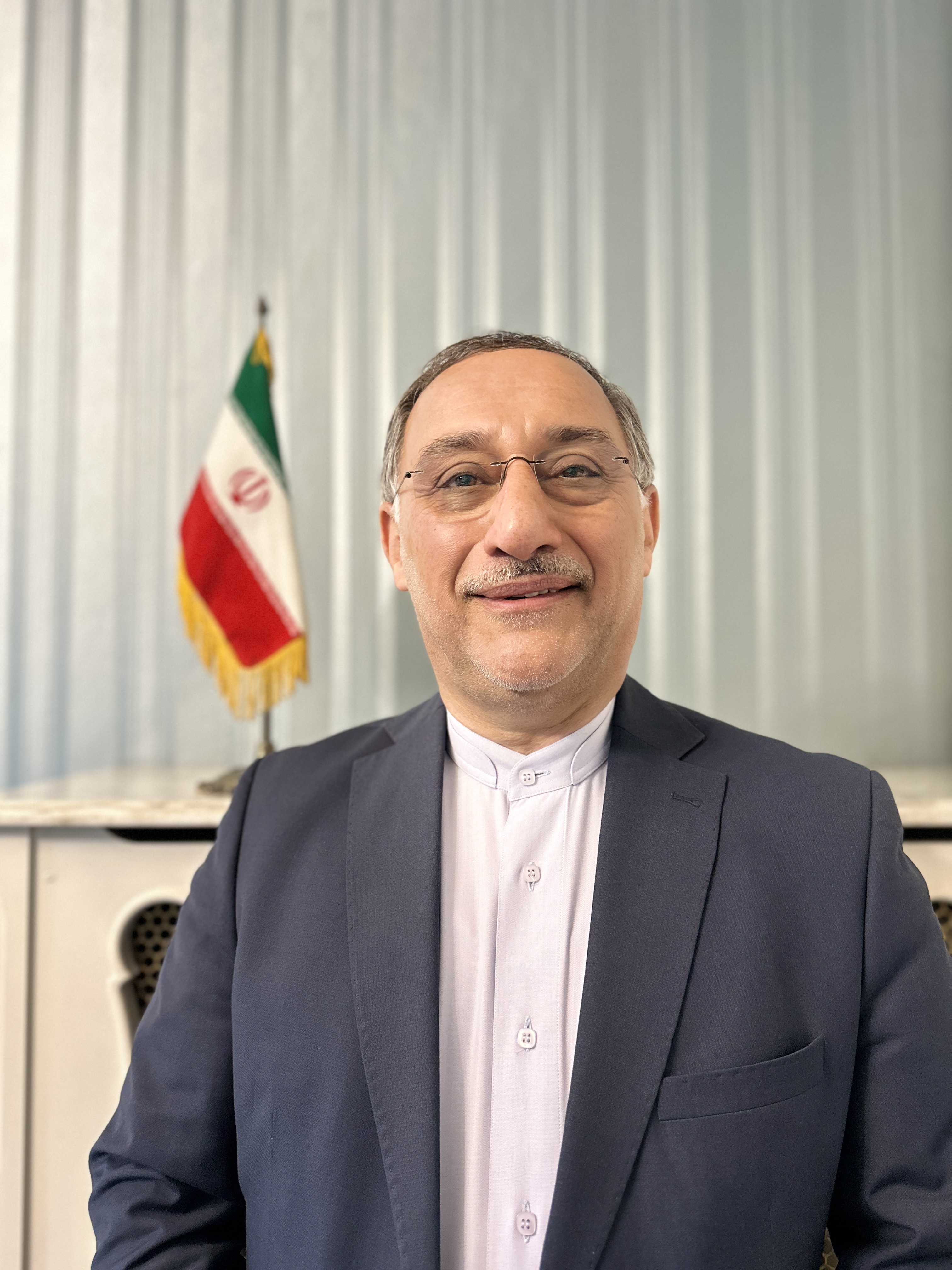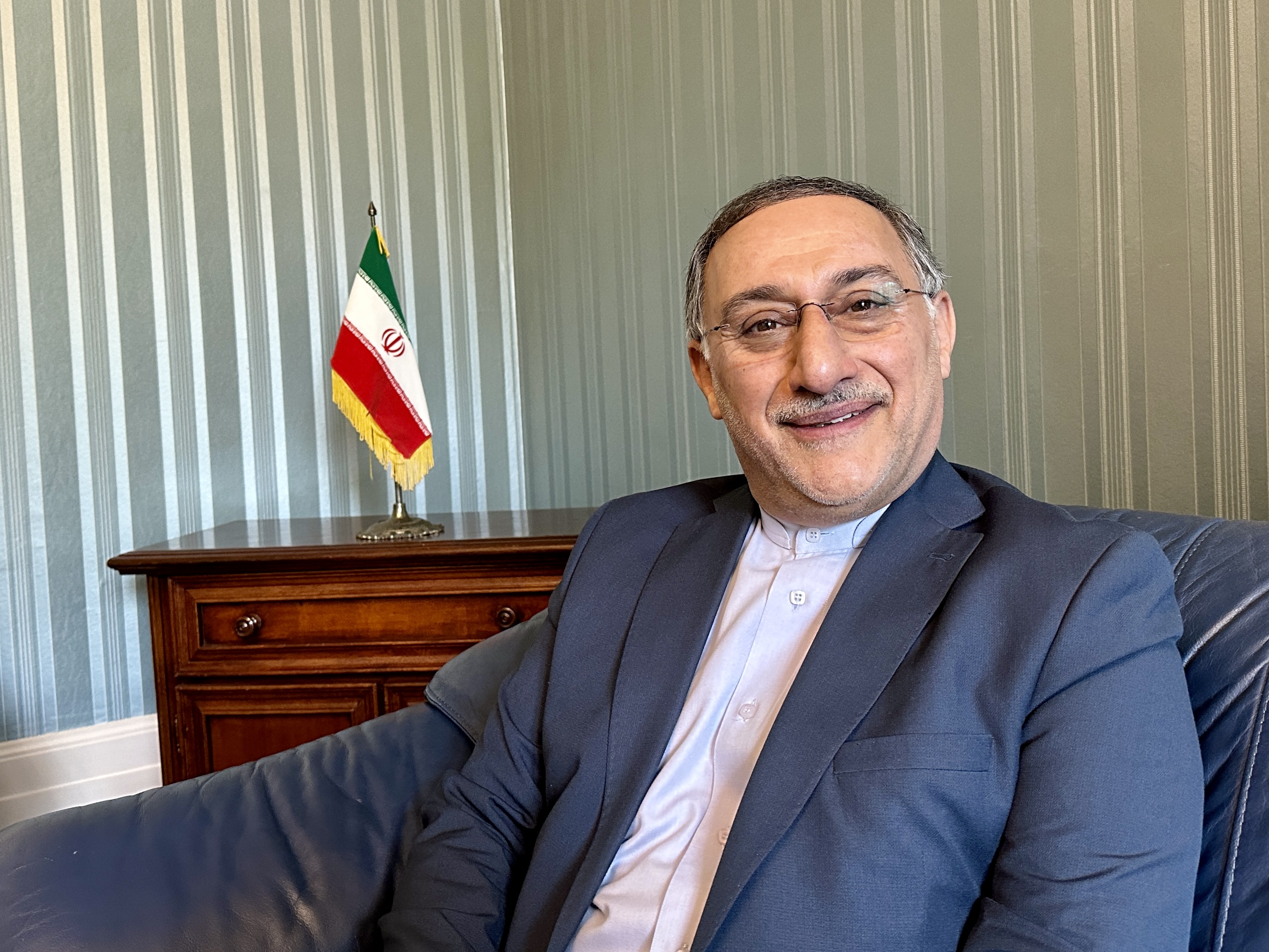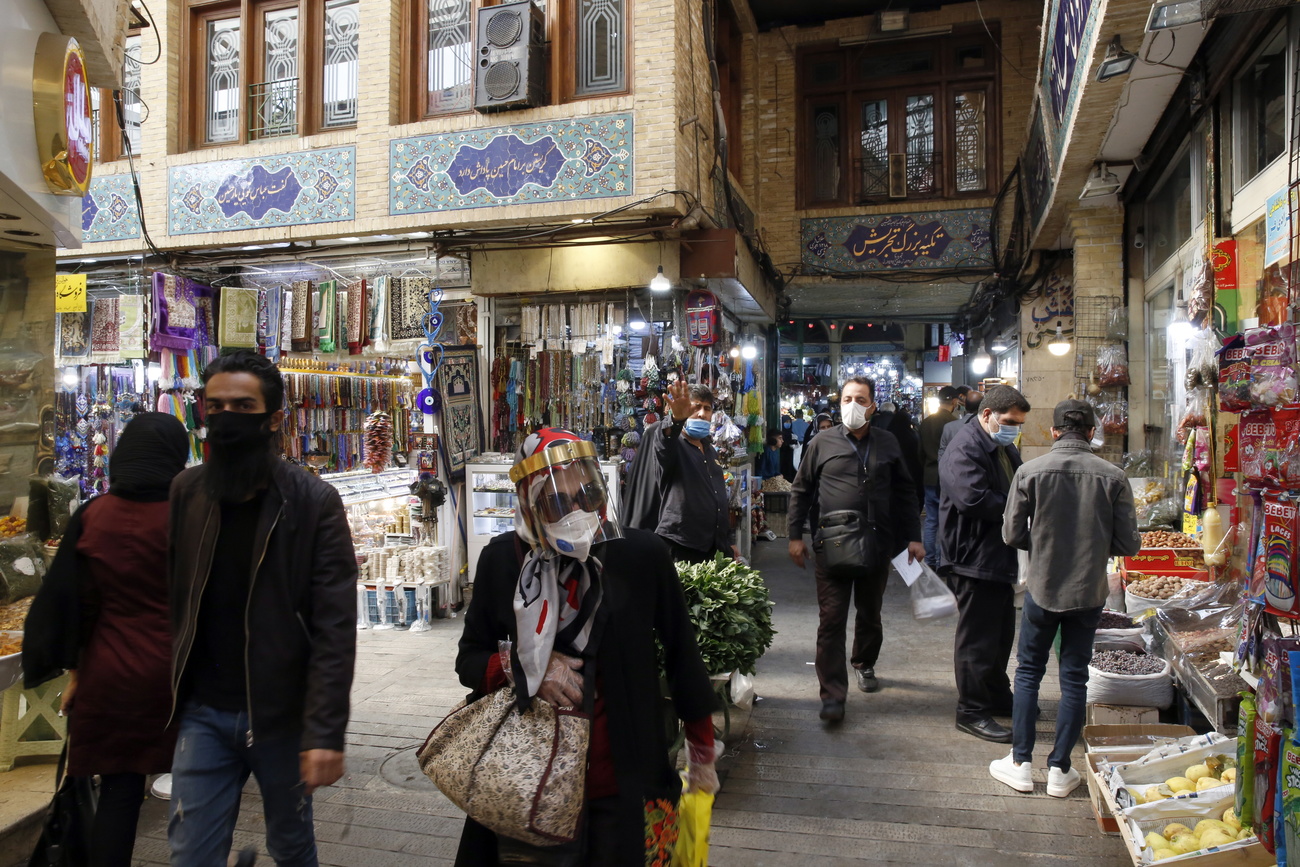Iranian Ambassador satisfied with Swiss mediation but unhappy with sanctions

In an exclusive interview with SWI swissinfo.ch, Iranian Ambassador to Switzerland Mahmoud Barimani addresses Switzerland’s role as a mediator amid escalating conflicts in the Middle East.
Since 1980, during the hostage crisis at the US embassy in Tehran, Switzerland has represented American interests in Iran, facilitating diplomatic and consular relations.
Switzerland also represents Iranian interests in Egypt and Canada, and until recently, in Saudi Arabia. However, recent rapprochements between rival nations, mediated by regional players such as Oman, Qatar and China, has caused Switzerland’s role as an intermediary to fade.
Tensions between Iran and Israel have worsened, particularly following Iran’s strikes on Israel on April 13 in response to attacks on its embassy compound in Syria on April 1.
Amid these developments, Iranian Ambassador to Switzerland, Mahmoud Barimani, provides insights into the significance of Switzerland’s role as a mediator, and the situation in the Middle East in an exclusive interview with SWI swissinfo.ch.
SWI swissinfo.ch: Let’s start with the Iranian strikes on Israel on April 13. The United States denied receiving a 72-hour advance notice from Iran through Swiss intermediaries. However, Iran says notice was given. Could you confirm if the notice was sent to the Americans?
Mahmoud Barimani: I should explain first that the Israeli attack on our embassy premises was unlawful, violating international law, the UN Charter, the Vienna Convention of 1961 and the New York Convention of 1973. The Israeli F-35 aircraft targeted the consular section of our embassy and the ambassador’s residence in Damascus. Before that, Israel had been assassinating our scientists and engaging in espionage and other hostile activities inside Iran. Over the past seven months, they targeted over 20 of our top military advisers in Syria, who were there at the invitation of the Syrian government.
We had no choice but to respond to the embassy attack, and we did so after informing the Americans through the Swiss embassy well in advance. We targeted military bases from which the Israeli attacks originated, being careful to avoid civilian casualties. Our response was limited, but any further Israeli military action would be met with a stronger response.
SWI: Apart from transmitting that message, did Switzerland have any other communication role during the attack?
M.B.: Switzerland has been entrusted with our interests in the US for over four decades under its protecting power mandate. They have transmitted messages accurately and on time between us and the US. Their role in facilitating communication has been viable and effective.
SWI: The Swiss foreign ministry condemned the Iranian attacks on Israel, stating that they significantly increased risks for the region. How do you respond to this, given Switzerland’s mandate for Iran?

M.B.: This question should be directed to the Swiss government.
The Israeli aggression against our diplomatic premises should be condemned by everyone, as the inviolability of diplomatic premises is a fundamental principle of international law. The aggression was also condemned by the Swiss government. If a European embassy had been targeted, the response would have been strong, as stated by David Cameron, the British Foreign Secretary. The same standards should be applied to Iran.
SWI: Some reports suggest direct US-Iran bilateral contacts in Oman in January regarding a potential ceasefire in Gaza, bypassing intermediary discussions. Can you confirm this?
M.B.: In addition to the Swiss channel, we occasionally use intermediaries like Oman and others in the Persian Gulf region. We explore these opportunities if they benefit regional peace and stability.
SWI: Can you confirm these direct contacts, or is it always done through intermediaries?
M.B.: It’s generally through intermediaries.
SWI: You’ve described Switzerland’s role as an intermediary as effective for the past four decades. Do you still believe Switzerland is doing a good job, or is its influence waning?
M.B.: Trust and confidence have been key factors over the years between us. Switzerland has proven trustworthy. They communicate messages accurately. Our cooperation has further strengthened, and we believe we are on the right track for a stronger cooperation. This is why we also entrusted the protection mandate to Switzerland for Saudi Arabia and Canada.
SWI: On March 10, Iran and Saudi Arabia expressed their intention to re-establish diplomatic relations with Chinese mediation. Can you confirm that as a result Tehran terminated Switzerland’s mandate to represent its interests in Saudi Arabia, effective August 2023?
M.B.: Yes, the mandate was terminated last year with Saudi Arabia after the rapprochement.
SWI: In September 2023, during an Iranian-American prisoner swap, both Qatar and Switzerland played a role. Can you elaborate on Switzerland’s involvement?
M.B.: Qatar played a significant role, but Switzerland also contributed. Swiss officials, including the Middle East and North Africa division director of the foreign ministry, and their ambassador in Tehran, were present in Doha in the course of the prisoner swap.
SWI: Given the agreement between Saudi Arabia and Iran mediated by China, do you believe Switzerland’s role in the region will weaken?
M.B.: No. China played an important role in the rapprochement, but this does not undermine the overall role of Switzerland. Switzerland still holds the protection mandate for us in the US and in Canada. We welcome any initiative by Switzerland that leads to regional peace and stability. Each player has its role, and Switzerland continues to play a significant part.
SWI: Switzerland has supported various UN and EU sanctions against Iran. How does this affect its role as an intermediary?
M.B.: We are unhappy with these positions and have raised our objections in this regard to the Swiss government.
SWI: How do you respond to accusations that Iran destabilises the region by supporting groups such as Hamas, Hezbollah and the Houthis?
M.B.: These are allegations. We are committed to regional stability and de-escalation in the Middle East, as seen in our endeavours in the past couple of months. Furthermore, to enhance regional stability and cooperation in the Persian Gulf, we have presented initiatives which are on the table, i.e. the Regional Dialogue and Non-Aggression Pact.
The Israeli regime’s actions in Gaza, where over 35,000 people have been killed, are genocide and war crimes. The root cause of the conflict is occupation and aggression, not Iran’s actions. The public is aware of this, since demonstrations are taking place in Europe and globally against these atrocities. Accusations against Iran do not change the reality on the ground.
The “Hormuz Peace Endeavor” (HOPE) was introduced by President Hassan Rouhani at the United Nations General Assembly in 2019.
The initiative aims to form a coalition of Persian Gulf countries, including Iran, Iraq, Saudi Arabia, Kuwait, Qatar, Oman, Bahrain, and potentially Yemen, to ensure collective security.
HOPE focuses on non-aggression, non-interference and respect for sovereignty. Its aim is to secure energy supplies and ensure free navigation in the Strait of Hormuz, between the Persian Gulf and the Gulf of Oman, while promoting peace and mutual understanding among regional states.
In 1974 Iran proposed an initiative for a Middle East free from weapons of mass destruction (WMD). This proposal, supported by Egypt and registered with the United Nations, aims to establish a zone free of nuclear, chemical and biological weapons in the region. This initiative seeks to prevent the spread of WMDs, promote disarmament and contribute to long-term regional peace and stability.
Sources: Atlantic Council, IRNA English, UN News
SWI: What measures are necessary to prevent further escalation of the conflict in the region?
M.B.: An immediate ceasefire and humanitarian aid for those in need are essential. The Rafah crossing (between Gaza – controlled by the Israeli army – and the Egyptian border) should be opened for aid. People should return to their homes, and prisoners could be exchanged. Gaza reconstruction should follow. Without addressing these principles, stability and peace cannot be achieved.
SWI: Before the 1979 Islamic Revolution, Iran and Israel had closer ties. Do you think the relationship could improve? Would a one-state (governing both Jewish and Arab Palestinians) or two-state solution create the conditions for the recognition of Israel by Iran?
M.B.: We do not recognise the occupying regime of Israel. In order for them to decide their own future, we propose a referendum and election. Both the original Palestinians, who were expelled in 1948, as well as those living on site – including Muslims, Jewish and Christians – can participate.
The two-state solution has not been effective and doable, let alone [Israeli Prime Minister Benjamin] Netanyahu’s government rejection of that solution. Our position is a democratic solution through holding a referendum.

SWI: Recently, Iran and Russia have strengthened their ties. As a response, Israel communicated its ‘red lines’ to Russia regarding Iran’s activities in Syria. How does Iran perceive these diplomatic moves?
M.B.: Our relationship with Russia is independent of the opinions of others. We are in Syria at the invitation of the Syrian government, providing military advisory services as requested. The red lines you mentioned do not change our decisions.
SWI: So you disregard Israel’s communication of red lines?
M.B.: Yes, we make our own decisions regardless of Israel’s stance, as we do not recognise the Israeli regime.
*This interview was conducted in face to face in May.
Edited by Virginie Mangin/ts

In compliance with the JTI standards
More: SWI swissinfo.ch certified by the Journalism Trust Initiative











You can find an overview of ongoing debates with our journalists here . Please join us!
If you want to start a conversation about a topic raised in this article or want to report factual errors, email us at english@swissinfo.ch.